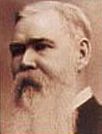Today is the best day of the war thus far for the United States of America, as General Ulysses S. Grant captures the Confederate’s Fort Donelson on Tennessee’s Cumberland River, following a four day campaign.
After the capture of Fort Henry, ten miles to the west and ten days earlier, Grant’s army had marched to Fort Donelson, an imposing fortification sitting on a high bluff above the river. Protected by some 21,000 Confederate troops by the time Grant arrived, prospects of capture had seemed daunting. With only 15,000 troops, Grant proceeded to trick and out-maneuver the Confederate forces over the next three days, leading to today’s events. Grant demands “unconditional and immediate surrender,” and the rebels have no choice but to do so. Only 5,000 Confederate soldiers manage to escape as Grant takes control of Donelson.
The victory signals the end of Confederate hopes in Kentucky and opens Tennessee for Union occupation.
Baptist soldiers fight on both sides this day. One is Confederate John Richard Mills of Providence, Kentucky, who is among the captured. Mills is sent to prison at Indianapolis, Indiana, and eight months later is released in a prisoner exchange in Vicksburg, Mississippi. He survives the war and lives a long life as a practicing Baptist layman.
Further to the West, the soon-to-be famous Benjamin H. Carroll (more commonly known as B. H. Carroll) (1843-1914) is serving as a Texas Ranger. In April he joins the Seventeenth Regiment Texas Infantry, but harbors no illusions as to the fate of the South. Perhaps voicing what many other southerners were afraid to say, he warned that a speedy victory for the South was not possible, that Northern troops were tenacious, and that the South could not depend upon peace Democrats or European intervention to bring about a favorable conclusion to the war. During one of his frequent camp-fire debates while serving in the army, he warns anyone who will listen that it would be “madness to underestimate the talents and resources” of U.S. General Ulysses S. Grant, using Grant’s brilliant victory at Fort Donelson as an example of the general’s greatness.
B. H. Carroll survives the war and is converted to Christ at a Methodist camp meeting in 1865. He later becomes a Baptist — one of the most famous Baptists in Texas history. His service in Baptist life reaches a pinnacle in the founding (1908) and first presidency of Southwestern Baptist Theological Seminary.
Sources: Summary of the capture of Fort Donelson (link); brief overview of B. H. Carroll, including photo (link); J. B. Cranfill, “Sermons and Brief Sketch of B. H. Carroll, D.D.,” 1908 (link)



